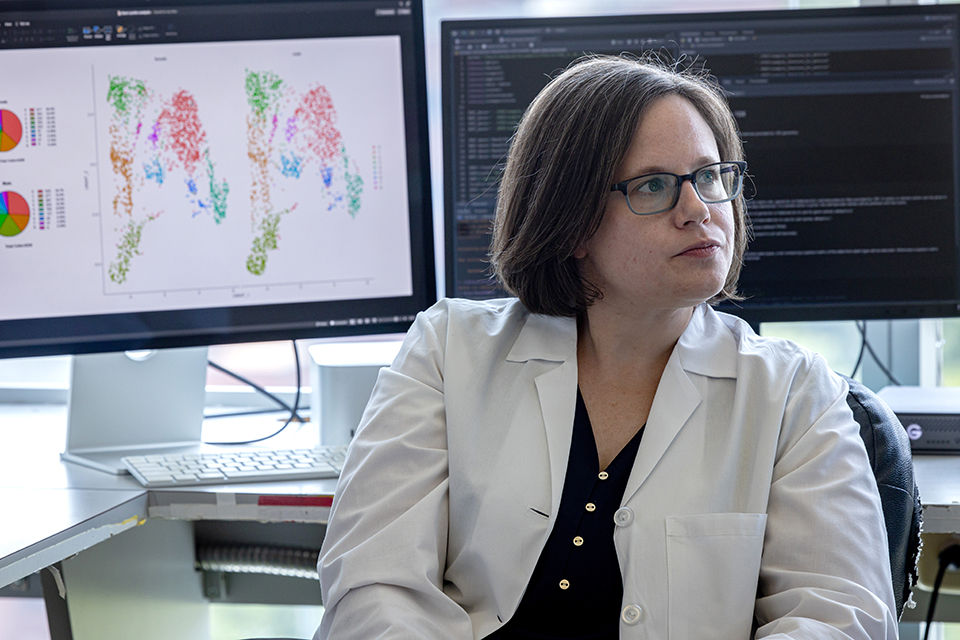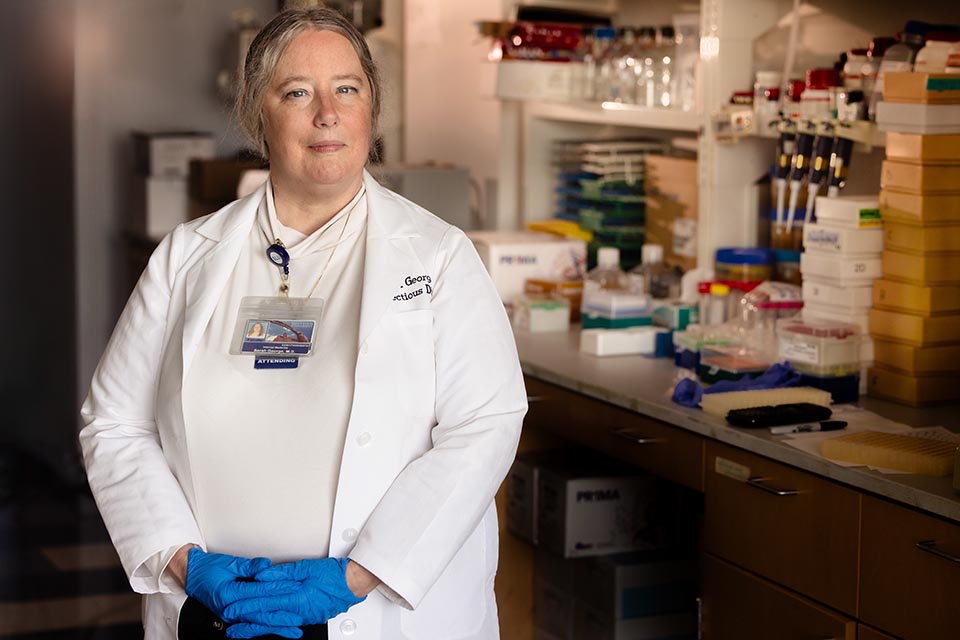SLU Researchers Identify Sex-Based Differences in Immune Responses Against Tumors
Researchers at Saint Louis University School of Medicine investigated differences in T-cell responses between male and female patients with lung cancer that may help direct future treatments. T-cell responses are part of the adaptive immune system, part of the body’s “smart system” that monitors for threats and fights them with customized defenses.
"Therapies that use the patient's immune system to fight their disease have a lot of potential to change how patients are treated. However, one of the biggest problems in the field right now is that these immunotherapies work well only in a small fraction of patients," Elise Alspach, Ph.D., assistant professor of molecular microbiology and immunology at SLU, senior author on the paper.

Elise Alspach, Ph.D., assistant professor of molecular microbiology and immunology, and her team identify sex-based differences in immune responses against tumors. Photo by Sarah Conroy.
Alspach and her team aimed to understand what determines good T-cell responses in patients, why some patients seem to have better T-cell responses than others, and why some patients respond well to immunotherapies. Research findings recently published in Cancer Immunology Research show that a protein called CXCL13 that has recently been linked to immunotherapy response in patients is more highly expressed in females than males. Additionally, Alspach and her team found that CXCL13 expression is a better marker of immunotherapy response in females than in males.

Elise Alspach, Ph.D., conducts research in a lab at Saint Louis University. Photo by Sarah Conroy.
Alspach and her team used single-cell RNA sequencing in human datasets to understand more about differences in how male and female immune systems respond to tumors. Single-cell RNA sequencing allows scientists to learn what’s happening inside individual cells. Using this technology, Alspach and her team determined that T-cells that infiltrate female tumors are highly activated and ready to identify tumor cells and kill them. They also noted immune suppressive T-cells present more frequently in male tumors than in female tumors.
Alspach and her team discovered that there is growing evidence that the male sex is associated with a better response to immunotherapy, which she said appears to contrast with their work and recently published papers showing that females mount stronger immune responses against their tumors.
"We currently don’t understand why males would respond better than females to immune targeting therapies, but this interesting juxtaposition highlights the need for more research into the variable of sex in the immune response against cancer," Alspach said.
Alspach said the potential of immunotherapy is revolutionary as it mediates tumor rejection in patients and induces long-term remission.
"When we get infected with a virus, the immune system generates a population of cells that can remember that virus and do a better job of eliminating it from your body, so the immune system does the same thing against tumors,” she said. “The memory response against that tumor partly generates long-term remissions that we see in patients treated with immunotherapies."
Before the advent of immunotherapies, Alspach said cancer treatments were hard on the body and not tumor-specific or, in the case of small molecule drugs that targeted specific proteins inside tumor cells, frequently become resistant to therapies. Current immunotherapies are typically much better tolerated in more patients, and patients can maintain a higher quality of life because the immune system can be educated to specifically target the tumor rather than all the tissues in the body.
Because immune responses against tumors are different between the sexes, Alspach and her colleagues concluded that it makes sense to potentially design different treatments for male versus female patients. In the future, she hopes more appropriate therapeutic strategies will be devised to target the pathways that mediate better tumor control in ways that benefit individual patients.
This research was possible thanks to a recent investment in single-cell RNA sequencing technology at Saint Louis University, allowing researchers to bring us closer to new cures.
Additional authors include Richard J. DiPaolo, Ph.D.; Ryan M. Teague, Ph.D.; Michelle Brennan, Ph.D.; David DeBruin; Chinye Nwokolo; Katey S. Hunt; Alexander Piening; Maureen J. Donlin; and Stephen T. Ferris, Department of Molecular Microbiology and Immunology, Saint Louis University School of Medicine.
Latest Newslink
- A Camp Friendship that Stirred Up Lifelong BondsIn the summer of 2005, Mary Kate Keenoy (Chaifetz Grad '22) and Genevieve Willman met at SLU's Gardens to Tables culinary camp. What started as a shared interest in cooking grew into a lasting friendship that has endured for two decades.
- Bruce Bacon, M.D.: 1949-2025Bruce Bacon, M.D., professor emeritus of internal medicine, died Sunday, July 6, 2025. He was 75. Bacon was known globally for his expertise in all aspects of clinical hepatology, specifically hemochromatosis, viral hepatitis, chronic liver disease / general hepatology, and liver transplant. Bacon was also a member of the research team that discovered the gene for hemochromatosis, HFE, in 1996.
- SLU Launches William L. Clay, Sr. Institute of Civic Engagement and Economic JusticeThe Clay Institute will provide immersive learning experiences and hands-on training that address the social and economic challenges facing the St. Louis region and the nation. Institute programming will be available to all students with an interest in civic engagement and democratic participation.
- SLU Research Explores Depression's Ripple Effect on DiabetesA study conducted by researchers at Saint Louis University found that patients with depression were more likely to have uncontrolled diabetes over time and that depression contributes to a heightened economic burden to diabetes management.
- SLU/YouGov Poll: Statewide Cell Phone Ban for Missouri Schools Popular with VotersGovernor Mike Kehoe has signed Senate Bill 68 into law, enacting a statewide ban on the use of personal electronic devices, including cell phones, tablets, and smartwatches, throughout the school day in Missouri public and public charter schools.
- SLU Vaccine Center Will Enroll Healthy Volunteers in Yellow Fever Vaccine Clinical TrialSaint Louis University's Center for Vaccine Development will enroll up to 70 adult volunteers in a clinical trial to study the safety elicited by a new investigational vaccine for yellow fever, a potentially deadly disease that is spread by mosquitoes. The research is funded by Sanofi Pasteur.













